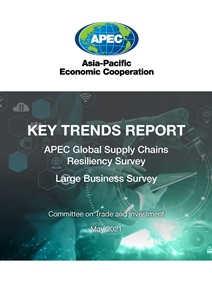Key Trends Report: APEC Global Supply Chains Resiliency Survey - Large Business

| Published Date | May 2021 |
|---|---|
| Type of Publication | Reports |
| Publication Under | Committee on Trade and Investment (CTI) |
| Accessed | 3258 |
| Pages | 36 |
| Download publication | Download |
Description
Key highlights:
- A high percentage of large businesses have either offshore branches, offshore manufacturing operations or offshore services operations.
- Only a very small number of large businesses have a woman as the head of their business operations which is similar to the findings from the SME survey. A majority (two thirds) of large businesses have fewer than 50% representation of women at the executive level. Almost a quarter have no women executives at all.
- Almost a third of the responding large businesses estimate that they sell goods and services to more than other 10 large businesses as inputs into their global supply chains, while almost another third do not know to how many they sell to.
- A third of responding large businesses estimate that they receive goods and services as inputs into their global supply chain from more than 10 SMEs, while almost another third does not know how many goods and services from SMEs they receive as inputs. However, this would be dependent on who completed the survey within the business, and they may not have complete overnight of the procurement process. Although these findings still support the concept that large businesses have little transparency into their supply chains, and often have little knowledge of the SMEs that are critical providers of goods and services within their supply chains.
- Several issues control the extent to which large businesses source from SMEs. Key attributes of supplier performance include the ability of SMEs to meet quality requirements, conform to due diligence risk requirements when sourcing from international SME suppliers from other markets, financial health, ability to meet cost and price targets and technological capability.
- Other sourcing considerations include concerns over business ethics and legal considerations, available capacity, and delivery times/costs (frequency, lead times).
- A number of responding businesses report that their risk and due diligence requirements for SME sourcing have increased as a result of COVID-19.
- A quarter of large businesses experienced delivery delays/failures followed by reduced customer demand and production facility closures because of COVID-19.
- Over a third of large businesses are planning to expand their global supply chains while a third have no plans to change.

